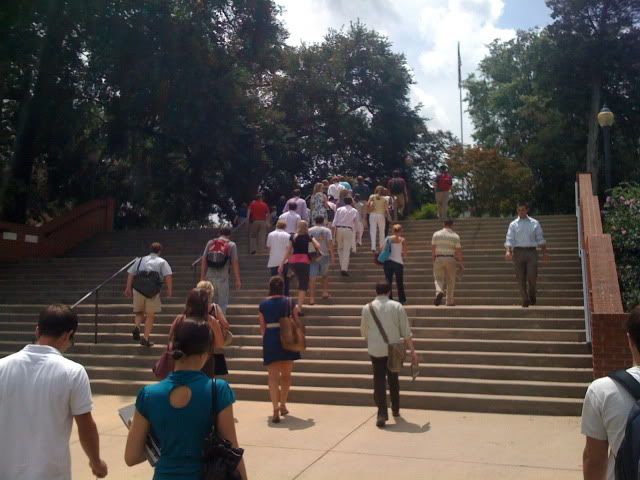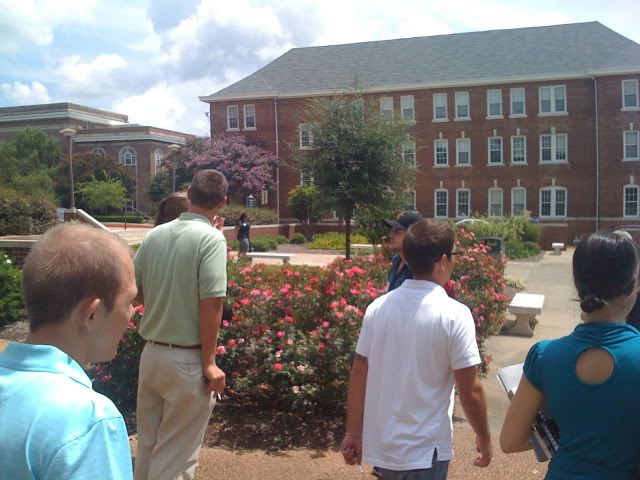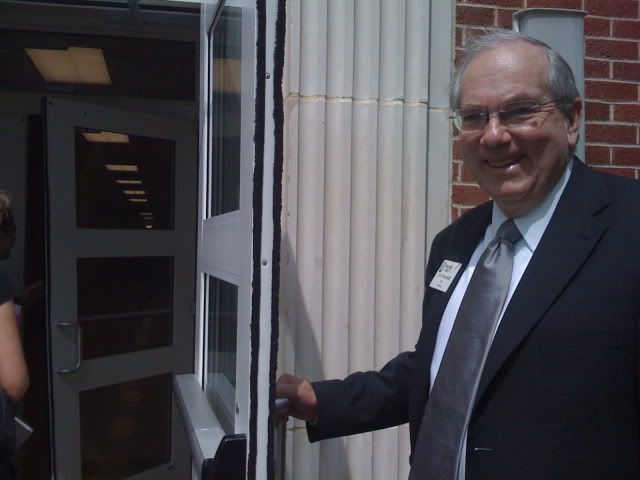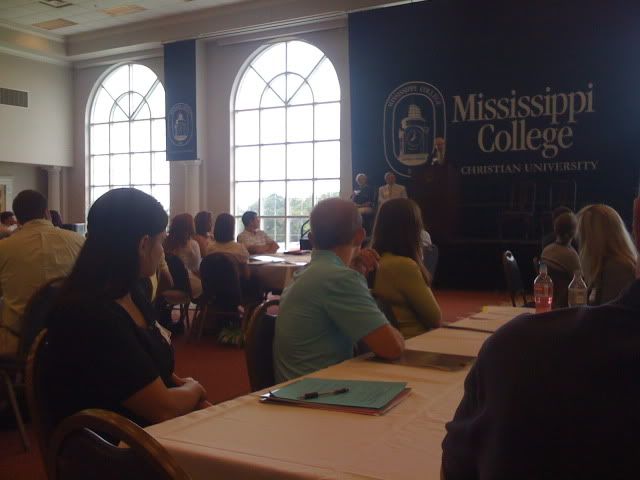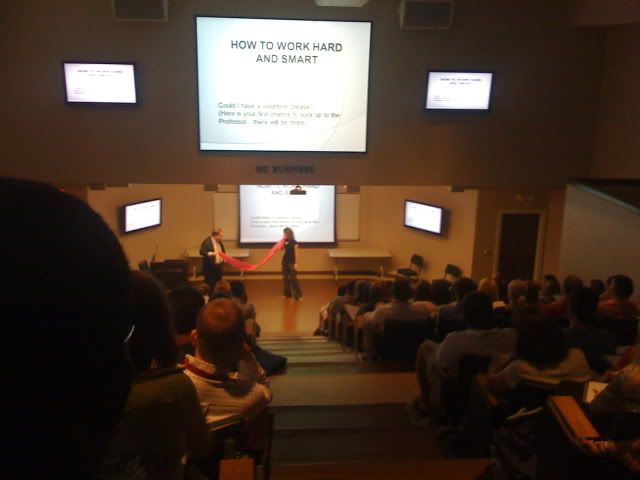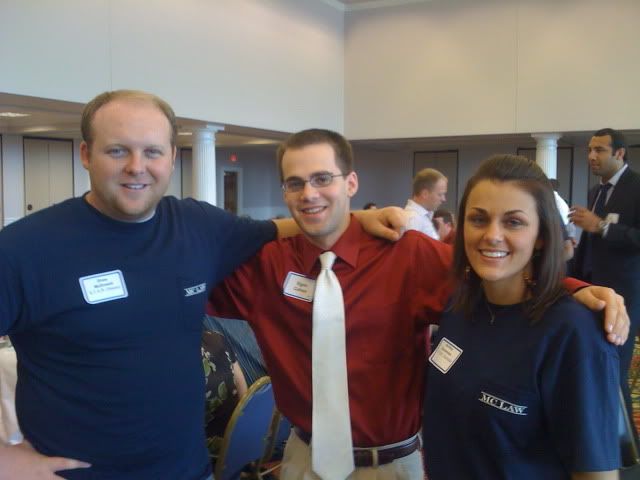I'm a reTTTard.
So far, I've been a mildly annoying gunner. My saving graces have been (a) speaking softly*, (b) the presence of a more obnoxious gunner, and (c) my overall competence.
Until today. Five minutes ago, I volunteered in Civ. Pro. and answered the question correctly, except for one minor detail: I confused 12(b)(1) with 12(b)(6). Yes, I'm a rock star.
The worst part is, I caught it just as the words were out of my mouth and started correcting myself as Prof. Challener (Severus Snape reincarnated as a southern belle) began her retort. Hilarity did not ensue.
*Perhaps I need a bigger stick.
[Tuesday, September 8, 2009]
[Wednesday, August 12, 2009]
Counterpoint: Clerkships and Ideology
Egon's point regarding clerkships and ideology is well taken. The truth is that most cases are not ideologically charged, although it's been remarkable the number of ways in which the law can be made less progressive -- impacting things that are supposedly not controversial (Chevron deference, standing -- thus, btw, giving rise to a conservative/progressive 12(b)(6) -- qualified immunity, and pre-emption, to name a few).
But let us first admit that it is not, most often, the potential clerks doing the ideological litmus-testing: it's the judges. It's judges who first started using clubs like the Federalist Society to make their clerks ideologically pure. There's a great article about this in a recent edition of Georgetown Journal of Gender & the Law [SSRN version] with some alarming statistics about refusal to cross ideological lines which is particularly acute amongst the conservative Supreme Court justices. So while there's talk of students selecting based on ideology, it's partially (in my opinion) a way of tempering expectations given that it's well known that many judges do so.
But I also think he's overlooking some real moral dilemmas that may be involved. Obviously, if the law compels a result, it compels a result, and one's personal convictions ought not to be determinative. Given recent Senate Judiciary Committee hearings, I'm not sure one could argue otherwise. Nevertheless, I think one could at least say that reasonable people can and do disagree on certain legal questions, for reasons both mundane and profound. If the difference of opinion between judge and clerk is of the latter sort -- profound to the point where one wants to write out a 40-point list of issues that the opinion raises -- what then?
But let us first admit that it is not, most often, the potential clerks doing the ideological litmus-testing: it's the judges. It's judges who first started using clubs like the Federalist Society to make their clerks ideologically pure. There's a great article about this in a recent edition of Georgetown Journal of Gender & the Law [SSRN version] with some alarming statistics about refusal to cross ideological lines which is particularly acute amongst the conservative Supreme Court justices. So while there's talk of students selecting based on ideology, it's partially (in my opinion) a way of tempering expectations given that it's well known that many judges do so.
But I also think he's overlooking some real moral dilemmas that may be involved. Obviously, if the law compels a result, it compels a result, and one's personal convictions ought not to be determinative. Given recent Senate Judiciary Committee hearings, I'm not sure one could argue otherwise. Nevertheless, I think one could at least say that reasonable people can and do disagree on certain legal questions, for reasons both mundane and profound. If the difference of opinion between judge and clerk is of the latter sort -- profound to the point where one wants to write out a 40-point list of issues that the opinion raises -- what then?
A Brief Thought on Clerkships
Several acquaintances have recently stated that they wouldn't clerk for a certain Superhottie of the Federal Judiciary (TM) because s/he is too conservative.
And that may well be the case. But how often are the political leanings of your judge really going to make a difference? Beyond the fact that most stuff at the circuit level (and certainly in a trial court*) is procedural, even controversial cases often defy a linear left/right understanding (e.g. Melendez-Diaz).
Further to the point, let us suppose that your circuit judge does something that absolutely shocks your conscience. Well, it's safe to say that it will probably shock the collective conscience of either the liberal or conservative bloc on SCOTUS and will thus be granted certiorari on appeal. A quick survey of COA judges reveals that they generally write between 20-30 majority** opinions a year, of which under two percent are granted cert.
Accordingly, even if your judge is a real pain in the ass, the odds are this pain will not directly impact your ass over the course of a one year clerkship. You're better off casting a wide net and finding a judge with whom you're personally and professionally, if not politically, compatible.
*I've yet to see a Democratic or Republican 12(b)(6).
**We won't include the dissents, because if the judge makes you draft an infuriating dissent, your side still won.
And that may well be the case. But how often are the political leanings of your judge really going to make a difference? Beyond the fact that most stuff at the circuit level (and certainly in a trial court*) is procedural, even controversial cases often defy a linear left/right understanding (e.g. Melendez-Diaz).
Further to the point, let us suppose that your circuit judge does something that absolutely shocks your conscience. Well, it's safe to say that it will probably shock the collective conscience of either the liberal or conservative bloc on SCOTUS and will thus be granted certiorari on appeal. A quick survey of COA judges reveals that they generally write between 20-30 majority** opinions a year, of which under two percent are granted cert.
Accordingly, even if your judge is a real pain in the ass, the odds are this pain will not directly impact your ass over the course of a one year clerkship. You're better off casting a wide net and finding a judge with whom you're personally and professionally, if not politically, compatible.
*I've yet to see a Democratic or Republican 12(b)(6).
**We won't include the dissents, because if the judge makes you draft an infuriating dissent, your side still won.
[Tuesday, August 11, 2009]
Alternative Orientations, A Pictorial
The pilgrimage begins:
Crossing the quad:
All ye who enter shall surely perish:
Crossing the quad:
All ye who enter shall surely perish:
Door Closes, Door Opens
I suppose it's time to "allow myself to introduce ... myself." I've been spending some time tinkering with the back-end of the blog and it's Egon's big first day so I've been happy to let him have the floor which he so ably occupies (and in ways that I would never imagine). My own law school is on the quarter system, meaning I've got more than a month to go for orientation (much less classes) and so I'm in a very different place right now: still working, not even in the right city or time zone yet, and still without a firm lease.
As if further proof of this difference were needed: I actually received a rejection e-mail from a law school today. One generally thinks of the admissions cycle as ending in April or May, but with waitlists this excruciating cycle continues on well into summer.
I was waitlisted at an almost absurd number of schools actually -- from some (e.g.) that seemed to be blatantly playing the yield-protection game,* and from one in particular from whom the waitlisting (as opposed to an outright rejection) felt like no small accomplishment. This was from the latter (they placed me on their waitlist way back in April/May and kept me on ever since), and given the passage of time and what I felt was a remote likelihood, I had in fact rather forgotten about it.
In any case, the rejection e-mail included the following, which I'm certain is boilerplate language:
But facts are facts: certain schools produce appellate clerks, law professors, and prominent attorneys at higher rates than others. With the absurd competitiveness of the law school rankings/numbers game these days, it's well-known that transfers are on the rise. Given the particular weaknesses in mine and Egon's applications, we both might be good candidates for transfering, assuming we do well in our 1L years.
That's no small assumption -- I get the sense that 1L grades are a bit of a crap shoot -- but it's certainly something that's in the back of my mind, particularly because a good friend of mind did so successfully and has been very happy.
So, stay tuned to see how things play out over the course of the year.
*yield-protection ("YP") (noun) - the practice of not admitting students whose LSAT and GPA indicate a likelihood to attend a more prestigious/higher-ranked institution, for the purpose of improving one's "yield" (that is, the percentage of students who are admitted to a law school who matriculate), which is a large component of the U.S. News and World Report's law school ranking. to give the schools the benefit of the doubt, it's one way for them to to gauge interest of applicants (the assumption being that a sufficiently interested applicant will ride out the waitlist.)
[disclaimer to the preceding: I don't doubt that many schools may have had perfectly reasonable reasons to reject my particular candidacy, but the practice of yield-protection is well-known and did seem at least likely in at least a few cases.]
As if further proof of this difference were needed: I actually received a rejection e-mail from a law school today. One generally thinks of the admissions cycle as ending in April or May, but with waitlists this excruciating cycle continues on well into summer.
I was waitlisted at an almost absurd number of schools actually -- from some (e.g.) that seemed to be blatantly playing the yield-protection game,* and from one in particular from whom the waitlisting (as opposed to an outright rejection) felt like no small accomplishment. This was from the latter (they placed me on their waitlist way back in April/May and kept me on ever since), and given the passage of time and what I felt was a remote likelihood, I had in fact rather forgotten about it.
In any case, the rejection e-mail included the following, which I'm certain is boilerplate language:
If your interest in ... Law School continues into your first year at another law school, we would welcome your application as a transfer student in 2010.The truth is, I was already thinking about it, and I know that it's something that Egon has in the back of his mind, too: the transfer calculus. To be clear: I'm very happy to be going where I'm going, and the "worst case scenario" of "having" to stay there all three years is something I'm utterly content with.
But facts are facts: certain schools produce appellate clerks, law professors, and prominent attorneys at higher rates than others. With the absurd competitiveness of the law school rankings/numbers game these days, it's well-known that transfers are on the rise. Given the particular weaknesses in mine and Egon's applications, we both might be good candidates for transfering, assuming we do well in our 1L years.
That's no small assumption -- I get the sense that 1L grades are a bit of a crap shoot -- but it's certainly something that's in the back of my mind, particularly because a good friend of mind did so successfully and has been very happy.
So, stay tuned to see how things play out over the course of the year.
*yield-protection ("YP") (noun) - the practice of not admitting students whose LSAT and GPA indicate a likelihood to attend a more prestigious/higher-ranked institution, for the purpose of improving one's "yield" (that is, the percentage of students who are admitted to a law school who matriculate), which is a large component of the U.S. News and World Report's law school ranking. to give the schools the benefit of the doubt, it's one way for them to to gauge interest of applicants (the assumption being that a sufficiently interested applicant will ride out the waitlist.)
[disclaimer to the preceding: I don't doubt that many schools may have had perfectly reasonable reasons to reject my particular candidacy, but the practice of yield-protection is well-known and did seem at least likely in at least a few cases.]
Alternative Orientations Part I
To satisfy my growing legion of fans alleviate the boredom, I'll be live blogging MCSOL orientation via i-phone.
10:19 am, CST. I'm in a ballroom on the lovely main campus, wearing a name tag and sitting at a table with my legal writing section (5 men and 5 lovely southern belles). Waiting for the Dean to give his "Welcoming Remarks."
10:27 am, CST. Everyone's making introductions and this iphone is making me really anti-social. Will report back at 1:00 pm, but until then, gotta schmooze, baby!
11:28 am, CST. Sitting in a gorgeous lecture hall listening to Prof. Heatherington introduce us to legal scholarship. His definition of tenure: "Not having to care."
11:33 am, CST. Prof. Heatherington gives a demonstration involving the inflation of a large red plastic bag. Pictures forthcoming.
11:36 am, CST. Heatherington is introducing our first year courses. I'm sitting in the back eating donut holes.
1:35 pm, CST. This is more action-packed than I thought. Will recap when I get home at 5. Until then I leave you with the following quotes of the day, so far:
1. "Don't become a criminal attorney unless you'd be comfortable defending Hitler, Stalin, or Octomom."
2. "When discussing policy, don't become a bumper sticker ... for example, Obama's healthcare plan will not have 'death panels' ... or mandatory sex changes. Sorry to disappoint you."
3. "If you don't know an answer, at least be familiar with the abbreviations in your outlines. Don't pronounce them phonetically."
2:30 pm, CST. Finished early. Time to go set up my student account and hit the road.
2:32 pm, CST. We were having trouble naming our student law firm (aka legal writing section) when the following exchange occurred:
Me (jokingly): How about Cravath 2012?
Anonymous 1L: What's a Cravath?
10:19 am, CST. I'm in a ballroom on the lovely main campus, wearing a name tag and sitting at a table with my legal writing section (5 men and 5 lovely southern belles). Waiting for the Dean to give his "Welcoming Remarks."
10:27 am, CST. Everyone's making introductions and this iphone is making me really anti-social. Will report back at 1:00 pm, but until then, gotta schmooze, baby!
11:28 am, CST. Sitting in a gorgeous lecture hall listening to Prof. Heatherington introduce us to legal scholarship. His definition of tenure: "Not having to care."
11:33 am, CST. Prof. Heatherington gives a demonstration involving the inflation of a large red plastic bag. Pictures forthcoming.
11:36 am, CST. Heatherington is introducing our first year courses. I'm sitting in the back eating donut holes.
1:35 pm, CST. This is more action-packed than I thought. Will recap when I get home at 5. Until then I leave you with the following quotes of the day, so far:
1. "Don't become a criminal attorney unless you'd be comfortable defending Hitler, Stalin, or Octomom."
2. "When discussing policy, don't become a bumper sticker ... for example, Obama's healthcare plan will not have 'death panels' ... or mandatory sex changes. Sorry to disappoint you."
3. "If you don't know an answer, at least be familiar with the abbreviations in your outlines. Don't pronounce them phonetically."
2:30 pm, CST. Finished early. Time to go set up my student account and hit the road.
2:32 pm, CST. We were having trouble naming our student law firm (aka legal writing section) when the following exchange occurred:
Me (jokingly): How about Cravath 2012?
Anonymous 1L: What's a Cravath?
A Brief History
Of time this blog:
We were up late, and had nothing better to do, so we thought we'd start another law student blog. We realize the genre has somewhat jumped the shark -- but what can we say, the Hollywood episode is underappreciated.
Nick and I are similar in many ways (these will become apparent later), but in the spirit of the sacred text, this blog will explore our differences, comparing:
Maroons ... with ... Choctaws
Let the comparing and contrasting begin!
We were up late, and had nothing better to do, so we thought we'd start another law student blog. We realize the genre has somewhat jumped the shark -- but what can we say, the Hollywood episode is underappreciated.
Nick and I are similar in many ways (these will become apparent later), but in the spirit of the sacred text, this blog will explore our differences, comparing:
Boys ... with ... Girls
Rufus Wainwright ... with ... Leonard Cohen
Godless Heathenism ... with ... The Way, the Truth, and the Life
The North ... with ... The South
And most importantly:Rufus Wainwright ... with ... Leonard Cohen
Godless Heathenism ... with ... The Way, the Truth, and the Life
The North ... with ... The South
Maroons ... with ... Choctaws
Let the comparing and contrasting begin!
Subscribe to:
Comments (Atom)

